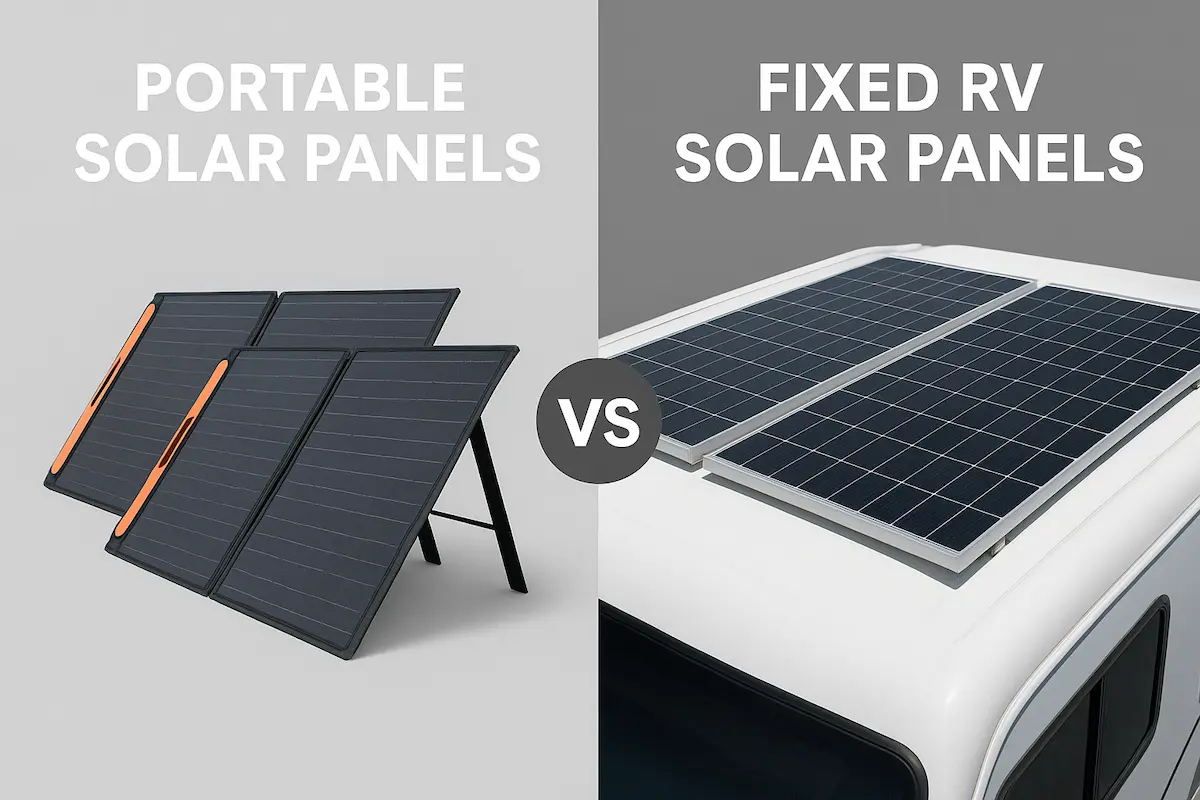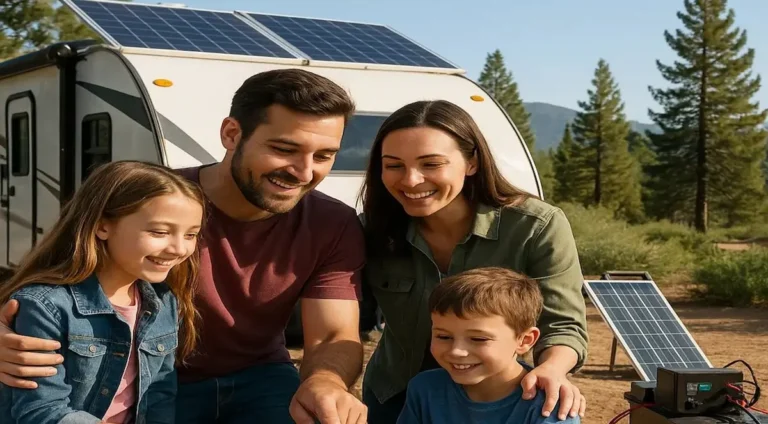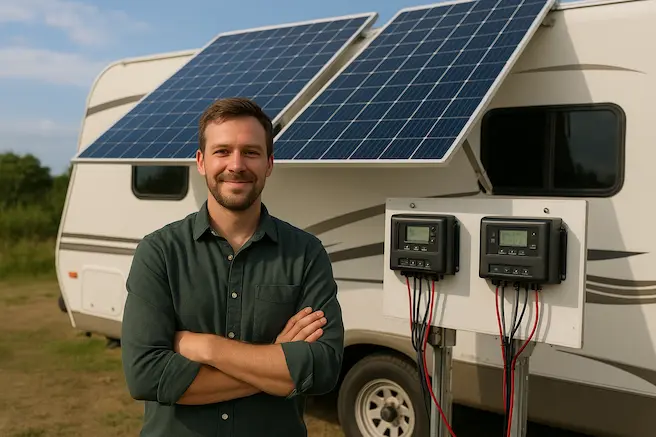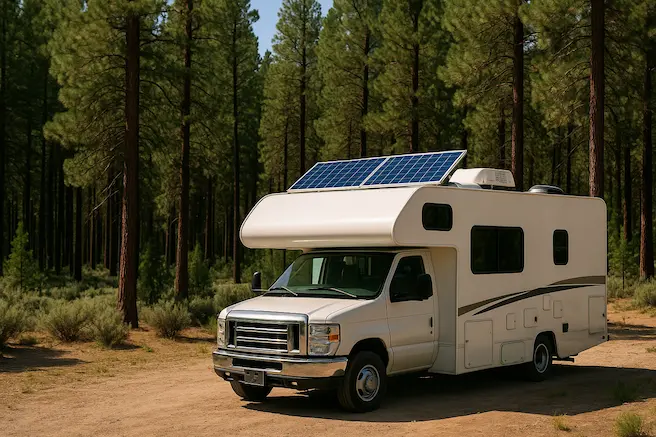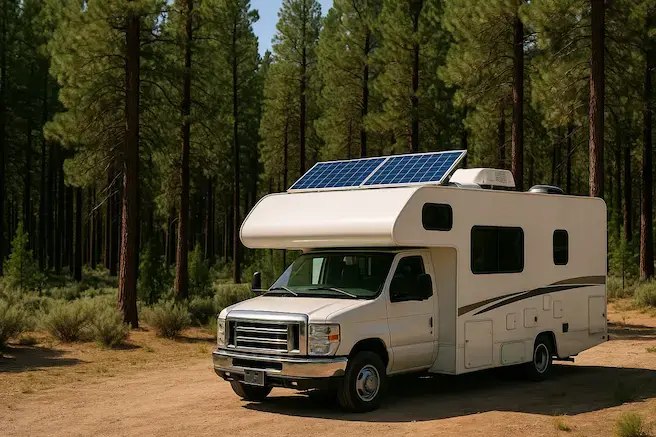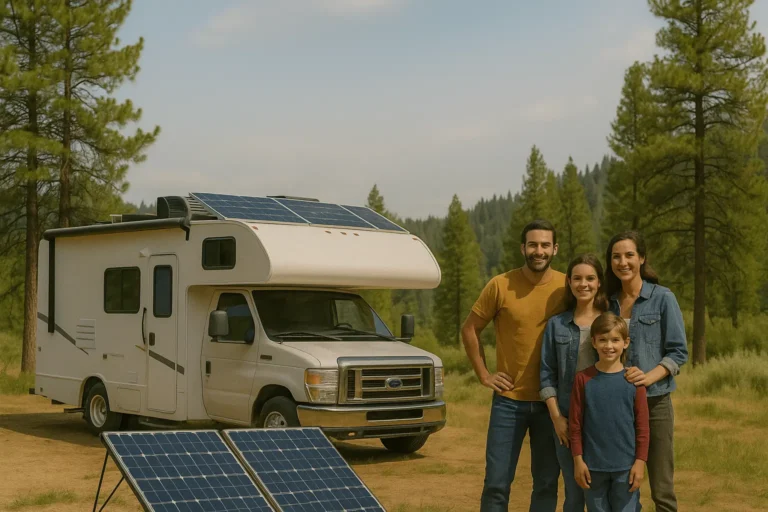Portable vs Fixed RV Solar– 7 Key Facts RVers Should Know
Trouble in the Desert: Portable Vs Fixed RV Solar Panels
The sun blazed over the Arizona desert as the Walker family finished breakfast. Their RV hummed quietly—until the fridge clicked off. Jake rushed to check the battery levels. Low again. He scratched his head. “Maybe it’s time we rethink this whole solar setup.”
They had been using portable solar panels for months. At first, they loved the flexibility. But now, packing and unpacking them daily felt tiring. Power was never enough.
Emily sipped her coffee, watching Jake fuss with wires. “What if we try fixed RV solar panels?” she asked.
Zoe and Ryan sat under the awning, charging tablets and munching on fruit. Like any modern family, they relied on stable power—even while off-grid.
That moment sparked their experiment. They decided to test both portable vs fixed RV solar setups while traveling.
Which one truly fits RV life? The answer might surprise you. Let’s follow their journey.
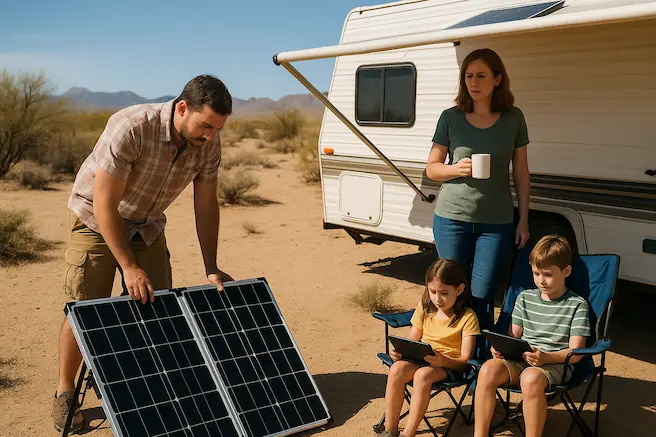
Chapter One: Why the Walkers Chose Portable Solar First in Portable Vs Fixed RV Solar Panels
When the Walker family first started RVing, everything felt exciting. The open roads, the freedom to camp anywhere, and the dream of going off-grid. But one question kept coming up: How would they keep their devices and fridge running in the wild?
After hours of research, Jake found a solution—portable solar panels. They seemed perfect. No need to drill holes into the RV. No complicated setup. Just unfold the panels, plug them in, and enjoy free solar power.
“It sounded too easy to ignore,” Jake said with a grin. Plus, they were cheaper than fixed RV solar panels. For beginners like the Walkers, this was a big win.
Learning the Benefits Firsthand
At first, portable panels worked well. Jake could move them around to catch the best sunlight. On cloudy days, he adjusted their angle for more power. This flexibility made a big difference during short weekend trips.
Another advantage was storage. When not in use, the panels folded up and slid into the RV’s rear compartment. It saved them from making permanent changes to their new RV.
Most importantly, the upfront cost was low. For a family testing RV life, spending less made sense. They didn’t want to commit to an expensive fixed RV solar setup without knowing if full-time RVing was right for them.
But the Drawbacks Appeared Quickly
However, the fun didn’t last long. Every time they parked, Jake had to set up the panels again. This daily task soon became a chore, especially when they moved campsites often
There was also the constant worry about theft. Leaving portable panels outside, even in remote areas, felt risky. Jake found himself checking on them more than relaxing.
Power output was another issue. Portable panels struggled to keep up with the family’s growing needs. Running a fridge, charging devices, and using small appliances drained the batteries fast. On cloudy days, the situation got worse.
Zoe and Ryan often heard their parents say, “Turn that off, or we’ll run out of power.”
A Lesson Learned
Through this experience, the Walkers realized that while portable solar panels are great for beginners, they come with limits. For part-time RVers or weekend campers, they offer a simple and affordable way to get started.
But for families like the Walkers, who wanted more freedom and less daily hassle, the need for something better became clear.
Next, they looked into a fixed RV solar solution. Their journey had just begun.
Explore top RV solar kits in 2025 to find the right system for your lifestyle.
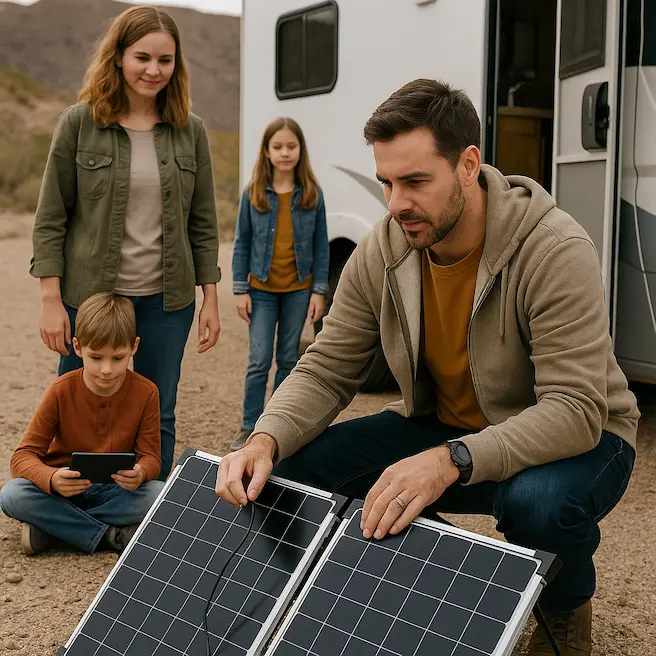
Chapter Two: Switching to Fixed RV Solar Panels
One windy afternoon in Utah, the Walker family faced a problem. A sudden gust knocked over their portable solar panels. Jake rushed to pick them up, but not before a corner cracked.
“That’s it,” he said, frustrated. “We need a better solution.”
This moment pushed the Walkers to explore fixed RV solar panels.
Why Fixed Panels Made Sense
For months, Jake had considered roof-mounted panels. However, he worried about the cost and the work to install them. But now, with growing power needs, the family had to decide which setup was better in the portable vs fixed RV solar panels debate.
Fixed panels offered big advantages:
- No more daily setup.
- Panels charged even while driving.
- No risk of theft.
- Cleaner, neater RV space
Emily liked the idea of not tripping over cables anymore. Zoe and Ryan just wanted their devices to stay charged without power limits.
Taking the Leap
After some research, Jake found a mid-range roof-mounted RV solar kit that fit their budget. Installation required a weekend of effort, but it was worth it.
“Once they were up, I realized how much time we had wasted setting up the portable ones every day,” Jake admitted.
Now, the panels worked in the background. Whether parked or driving, the family enjoyed steady power.
Living with Roof-Mounted Solar
The difference was clear. The Walkers could run their fridge, fans, and even charge laptops without worry. Cloudy days no longer stressed them out. The battery stayed full most of the time.
One downside? They couldn’t angle the roof panels for better sun exposure. But the benefits far outweighed this small issue. Emily appreciated the clutter-free space. Zoe loved doing online schoolwork without interruptions. Ryan enjoyed more movie nights.
“Life on the road became easier,” Emily smiled.
A Smart Upgrade
Switching from portable to fixed RV solar panels changed how the Walkers traveled. It saved them time, gave them more power, and removed daily headaches.
For anyone who camps occasionally, portable panels still make sense. But for full-time RV families, fixed systems bring peace of mind.
The Walkers never looked back.
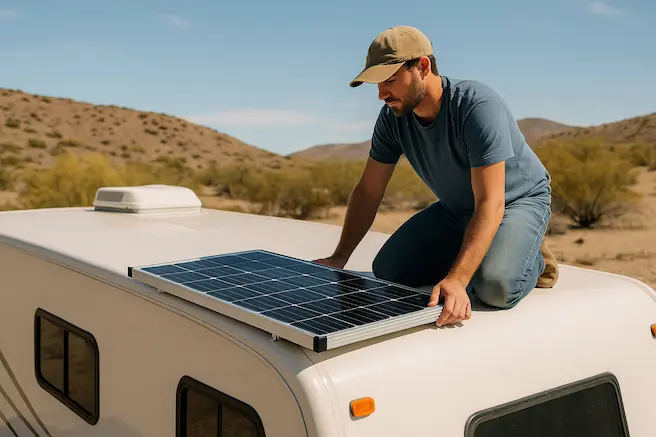
Chapter Three: Portable Vs Fixed RV Solar Panels – What Jake Noticed While Using Both
After months of testing, Jake had clear thoughts on portable vs fixed RV solar panels. Each had its place, but the differences were impossible to ignore.
For new RV owners, portable panels feel like a smart choice. They are cheap, flexible, and easy to start with. But for a busy family on the road, daily setup becomes a burden. Roof-mounted panels, though more costly, save time and offer more power.
“Both worked, but only one gave us real freedom,” Jake said.
Portable vs Fixed RV Solar: Walker Family’s Comparison
Let’s break down what they learned in a true portable vs fixed RV solar panels comparison.
| Feature | Portable Solar Panels | Fixed Roof-Mounted Panels |
|---|---|---|
| Setup Time | Needs 10–20 mins every time you park | One-time install, then works automatically |
| Sun Tracking | Can be adjusted manually for better sunlight | Fixed angle; less efficient in winter |
| Mobility | Can be moved to stay in sunlight | Stays on the roof; less flexible |
| Risk of Theft | High if left outside | No risk; panels are fixed securely |
| Storage Space | Takes up space inside the RV when packed | Uses only roof space; RV interior stays clear |
| Power Output | Limited by small panel size | Can install more panels for higher output |
| Upfront Cost | Budget-friendly starter option | Higher cost but long-term value |
| Ideal For | Weekend campers, beginners | Full-time RVers, families, heavy power users |
Jake’s Verdict
Jake summed it up perfectly:
“If you’re only camping on weekends, portable panels make sense. But if you live in your RV, like we do, fixed panels are a game changer.”
Emily added, “It’s not just about power. It’s about peace of mind.”
For the Walkers, switching to fixed RV solar panels made their life easier. More time for adventures, less stress about power.
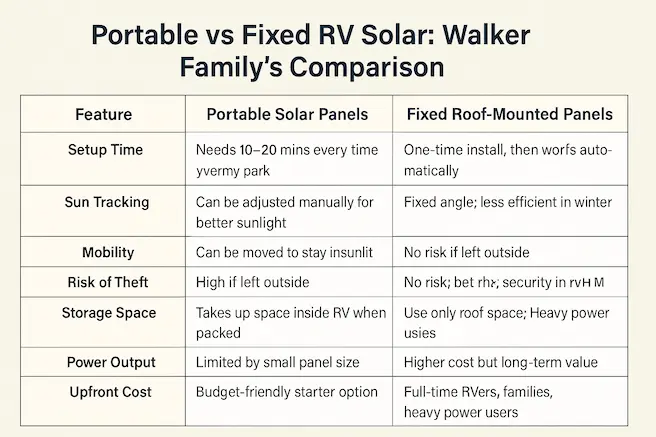
Chapter Four: Emily’s Perspective: Safety, Simplicity & Space
For Emily, RV life was about more than just travel. It was about keeping her family safe and happy. While Jake loved testing gadgets, Emily cared about the small daily struggles. And with portable solar panels, those struggles added up.
The Constant Hassle
Every time they set up camp, Emily worried. The kids ran around. Wires snaked across the ground. Zoe tripped once, skinning her knee. “I spent more time saying ‘Watch the cables!’ than enjoying the view,” Emily sighed.
At night, Jake brought the panels inside to avoid theft. That meant more clutter. Chairs, shoes, and now solar panels—space was getting tight. “It felt like we were packing and unpacking a moving van every day,” Emily joked. These small daily annoyances added up fast in the whole portable vs fixed RV solar panels journey.
Why Fixed Panels Felt Like Freedom
When they switched to roof-mounted RV solar panels, life got easier. No more cables to trip over. No more panels leaning against the wall. The RV felt open again.
Emily loved the simplicity. They could park, relax, and let the solar system do its job. No reminders. No safety worries. “Honestly, it gave me peace of mind,” Emily said.
She also noticed how much faster setup was. With portable panels, they needed an extra 20 minutes to get things running. With roof panels, everything worked right away.
That saved precious time—especially with two kids asking for snacks, games, and internet.
Safety First, Always
Emily cared about security too. Leaving portable panels outside made her uneasy. Even in quiet campsites, she felt the need to stay alert.
Roof-mounted panels removed that stress. Once installed, they stayed safe and secure. No packing up every evening. No worrying about someone walking away with their power source.
“Fixed panels weren’t just an upgrade for power. They were an upgrade for our sanity,” Emily explained.
A Game-Changer for Family RV Life
For Emily, the shift from portable to fixed RV solar wasn’t about tech specs. It was about simplifying life on the road. Less hassle, more family time.
She knew that for occasional campers, portable panels might be fine. But for full-time RV families, fixed panels were worth every penny.
Complete Guide to RV Solar Power in 2025
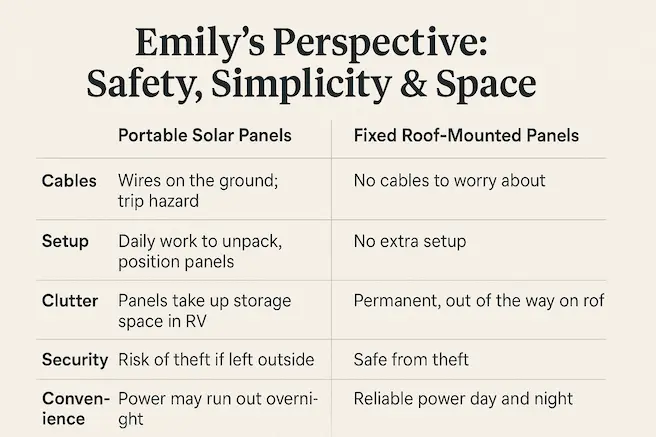
Chapter Five: Zoe & Ryan’s Take: School, Games, and Tablets
For Zoe and Ryan, solar panels weren’t about watts or wiring. They cared about one thing: power for their devices. And for that, life with portable solar panels was a struggle.
The Portable Panel Problem
Every morning, Zoe asked the same question: “Is there enough power for school today?” Sometimes, the answer was no.
Portable panels worked fine on sunny days. But if clouds rolled in or Jake forgot to set them up, the batteries dropped fast. Zoe’s online classes would lag. Ryan’s games would pause.
“Dad, my tablet’s dead again!” Ryan would complain.
Both kids got used to limited screen time, but it wasn’t fun. Portable panels couldn’t keep up with the family’s growing power needs.
The Fixed Panel Fix
Everything changed when the Walkers switched to fixed RV solar panels. The roof panels charged all day, even while driving. Zoe could attend her online classes without interruptions. Ryan could play games or watch cartoons without worrying about battery life.
“It’s like we leveled up,” Zoe smiled.
No more begging Dad to adjust panels. That was Zoe’s favorite part of switching in their own portable vs fixed RV solar panels experience. No more fighting over who got to charge first. The system just worked.
Freedom to Focus on Fun
Zoe loved having reliable power for her schoolwork. She could finish her assignments on time, even during long road trips.
Ryan enjoyed longer movie nights and game time. “The best part is, I don’t have to wait for the sun to come back out,” he said.
Both kids noticed how much calmer their parents became. Less stress about power meant more time for hikes, campfires, and stargazing.
A Kid-Approved Upgrade
For Zoe and Ryan, fixed RV solar panels weren’t just a technical improvement. They meant freedom—freedom to learn, play, and enjoy life on the road without limits.
“Portable panels were okay for short trips,” Zoe admitted, “but for full-time RV life, roof panels win.”
Even Ryan agreed. “Fixed panels are way cooler. We should’ve done this sooner.”
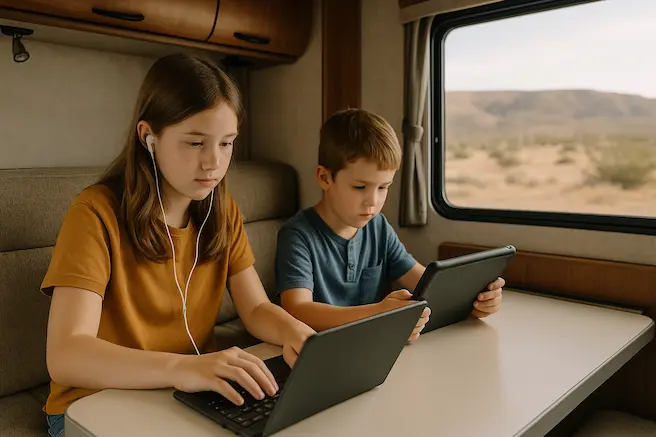
Chapter Six: Final Thoughts from Jake: Portable Vs Fixed RV Solar Panels
After months of using both systems, Jake had a clear view on portable vs fixed RV solar panels. He knew each had its place. But the right choice depends on how you travel.
Portable Panels: Great for Beginners
“If you’re just starting RV life or camp on weekends, portable panels are a smart choice,” Jake said.
They’re cheaper. You don’t have to drill holes in your RV. You can move them to catch better sunlight. For short trips, this flexibility is handy.
Jake remembered their early camping days. “Back then, portable panels gave us a simple way to learn solar without a big cost.”
But for long trips or families needing more power, portable panels often fall short.
Fixed Panels: Best for Full-Time RVers
“If you’re living in your RV, fixed panels are a game changer,” Jake explained.
No more daily setup. Panels charge even while you’re driving. The system feels invisible—it just works. For the Walkers, this made life easier and less stressful.
“It’s not just about power. It’s about saving time, avoiding clutter, and getting peace of mind.”
Emily, Zoe, and Ryan all agreed. Full-time RV life needed a system they could trust every day.
Jake’s Simple Advice
His advice now helps other families choosing between portable vs fixed RV solar panels setups. Jake summed it up in one line:
“Start with portable if you’re new. But if RV life is your main lifestyle, invest in fixed panels as soon as you can.”
He also suggested a mix. Some RVers use fixed panels for base power and portable ones for extra boost when parked in the shade. “It’s not one-size-fits-all. Think about your needs, your trips, and your family.”

The Walkers’ Journey Comes Full Circle
For the Walkers, switching from portable to fixed RV solar was part of their growth. They learned by doing, made mistakes, and found what worked best.
Today, they enjoy life on the road with reliable power and less hassle.
And Jake? He still loves tinkering—but now, with more time for the adventures that matter.
Product Recommendations – What Worked for the Walkers
After trying both systems on the road, the Walkers had clear favorites. “Here’s what Jake and Emily recommend—tested across both portable vs fixed RV solar panels setups.
They started small and slowly upgraded. You can do the same. Whether you’re a weekend camper or full-time RVer, these picks can help you choose the right portable or fixed RV solar setup.
Top Portable Solar Kits for Beginners
1. Jackery SolarSaga 100W Panel + Explorer 500 Power Station
Perfect for short trips and light use. It’s easy to carry, fast to set up, and runs basic gear like phones and small lights.
2. Renogy 100W Portable Foldable Solar Suitcase Kit
This panel folds like a suitcase and comes with its own charge controller. Great for RV beginners who want more power.
3. EcoFlow River 2 + 110W Panel Combo
EcoFlow River is Reliable, sleek, and beginner-friendly. Emily liked how quiet and compact it was.
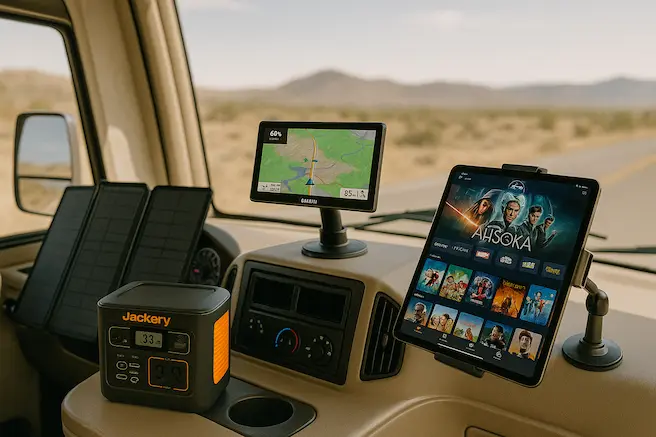
Best Fixed Roof-Mounted Solar Kits for Full-Time RVers
1. Renogy 400W 12V Solar RV Kit (MPPT)
Jake’s top pick. Strong, dependable, and comes with everything you need. Ideal for families using fridges, fans, and laptops.
2. BougeRV 200W Monocrystalline Panel Set
Budget-friendly but powerful. Ryan liked that it “charged the batteries fast—even on cloudy days.”
3. Zamp Solar Legacy 180W Deluxe Kit
Premium build quality and American-made. Built for rough roads and long trips.
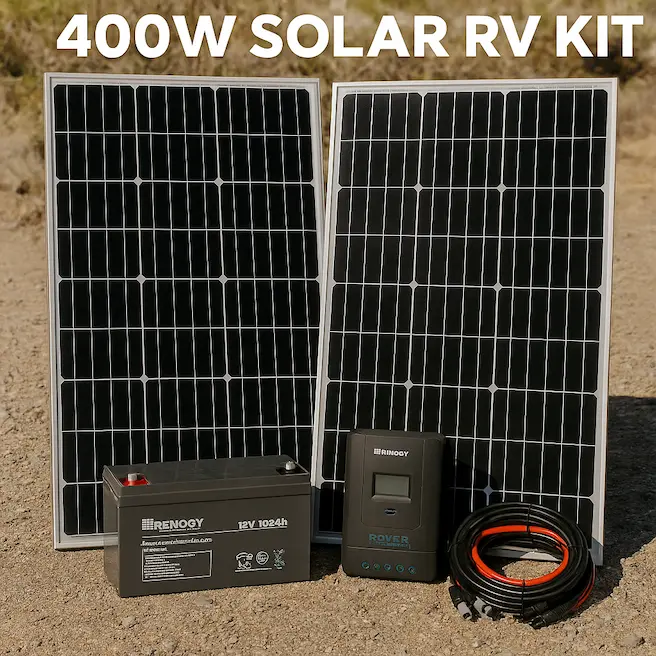
Bonus: Hybrid Setup for More Flexibility
Fixed Roof Panels + Small Portable Panel = Best of Both Worlds
Jake recommends keeping a small portable panel as a backup. “It’s great for shade parking or sharing power with other RVers.”
Try:
- 300W fixed + 100W foldable portable panel
- Combine with lithium battery and solar charge controller for best results
Choosing the right system depends on your travel style, budget, and power needs. The Walkers found success by testing both—and now, so can you.
Top 5 Complete RV Solar Kits Reviewed (2025)
Frequently Asked Questions (FAQ)
1. Can I use both portable and fixed solar panels on my RV?
Yes, you can! Many RVers—like Jake—use fixed panels for main power and a portable panel for shaded campsites. It’s a great way to stay flexible if you’re unsure which is better in your own portable vs fixed RV solar setup.
2. How much solar power does a family of four need in an RV?
It depends on your usage. The Walkers needed around 400–600W of solar power for daily use—charging devices, running a fridge, and using fans or lights. If you work remotely or have kids doing online school, you might need more.
How Many RV Solar Panels Do You Need?
3. Are portable solar panels waterproof and durable?
Most portable solar panels are weather-resistant, but not all are waterproof. Jake found that rain wasn’t a problem, but strong wind could knock them over. Always check the product specs before buying.
4. Do roof-mounted panels work when it’s cloudy?
Yes, fixed RV solar panels still work on cloudy days, but they generate less power. A good MPPT charge controller helps maximize energy even in low light.
5. Is it hard to install roof-mounted solar panels on an RV?
Not really—if you’re comfortable with basic tools. Jake installed his kit over a weekend. Most systems come with instructions. If you’re not a DIY person, a pro installer can help.
6. What’s cheaper—portable vs fixed RV solar panels?
Portable panels are cheaper to start with. But over time, fixed systems often give you more power and fewer problems. For short trips, portable wins. For long-term use, fixed is worth the upgrade.
7. Do solar panels drain the battery at night?
No. A good charge controller prevents battery drain. Both portable and fixed setups include one—just make sure it’s wired correctly.
Conclusion: Portable vs Fixed RV Solar Panels – What’s Right for You?
If you’re a weekend camper or just getting started, portable solar panels offer a low-cost, flexible way to explore solar power. But for full-time RVers or families like the Walkers, fixed roof-mounted solar panels deliver more power, less daily hassle, and long-term peace of mind.
Portable = Easy Start
Fixed = Reliable Freedom
The best solar setup depends on how you travel, how much power you need, and how often you’re off-grid. If you’re unsure, start with portable—and upgrade as your RV lifestyle grows.
Need help choosing? Check out our trusted product reviews for beginner kits and full-time systems.
Want to go deeper?
- Read our guide on how many RV solar panels you really need
- Or explore top RV solar kits in 2025 to find the right system for your lifestyle.
- Want to calculate your needs of RV Solar Equipment, use our Calculator to find out.

